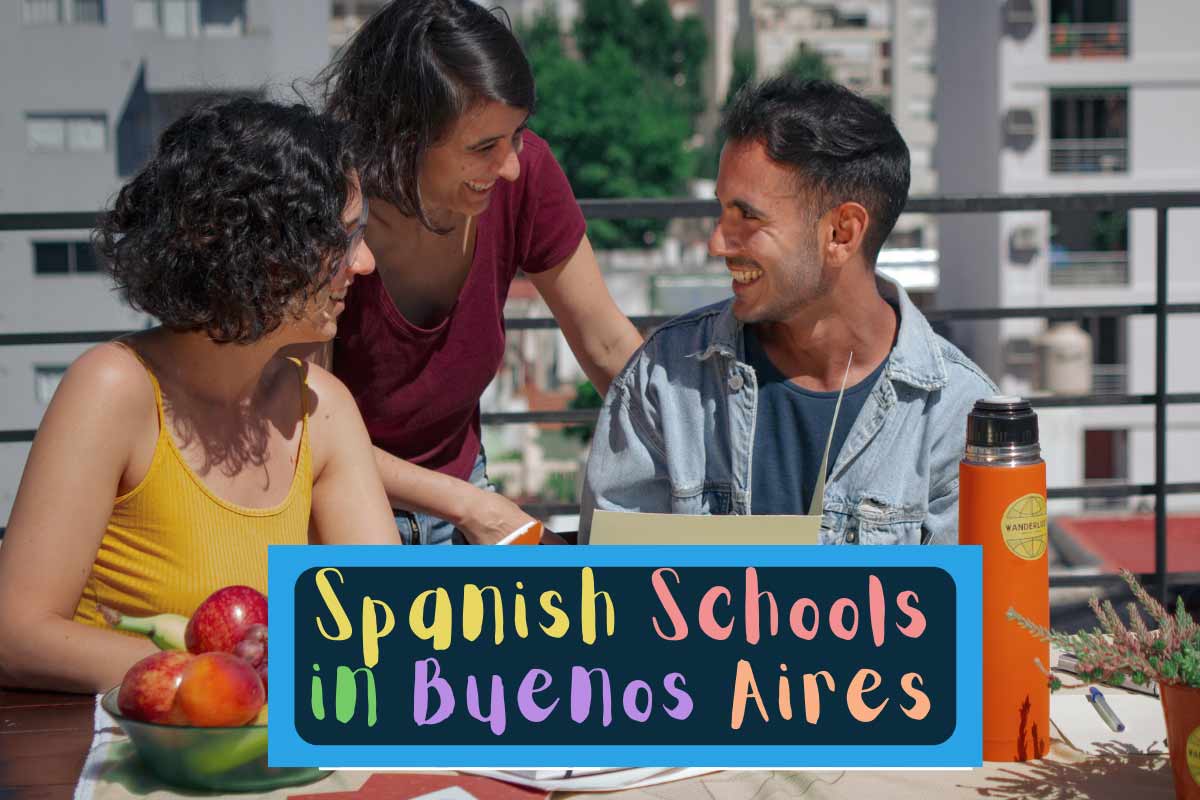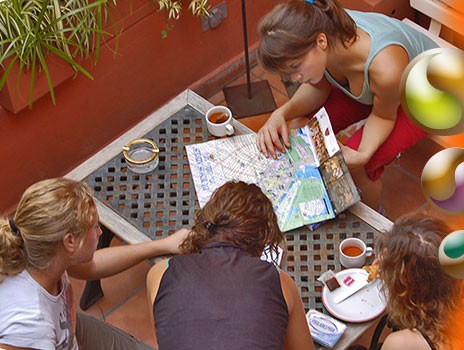Argentina is a great place to study Spanish. It’s a vast, beautiful country packed with culture, and the local twist on Spanish, Castellano makes it even cooler.

While most Argentines do study a little bit of English in school, relatively few speak it fluently, so visitors are inevitably forced to use Spanish or sign language to communicate at some point.
The more Spanish you speak as a visitor, the more people you can chat with while visiting.
And did you know learning a second language at any age and being bilingual is good for your brain?
Even if you already speak Spanish, you may want to take a couple of classes to learn about the regional use of ‘vos,’ Argentinismos and a bit of Lunfardo, the unique slang used extensively throughout the country, and especially in and around Buenos Aires and the River Plate region.
Self Study: Learning Spanish
For those who want to get a jump on their studies before arriving, there are a lot of great resources online for learning Spanish for autodidacts.
There are free apps that allow you to learn some basic phrases to get around.
The apps teach a more neutral Spanish, so language learners will have to keep in mind that Argentina has a particular accent and different vocabulary.
One free online resource that is dated but tailored to Spanish learners in the River Plate region is the U.S. Peace Corps manual for volunteers in Uruguay. (opens in a new tab).
Local author, Walter Freiberg has an entertaining Spanish novel series for adult language learners. The novel series starts at the beginner reading level and goes up to advanced.
Argentina also puts out some excellent films, that feature the often, fast-talking unique dialogue of the locals to really tune one’s ears.
Watching films (with subtitles in your native language if necessary) is a great way to train your ears to the Argentine dialect.
➡ Don’t miss the Buenos Aires International Independent Film Festival if studying in Buenos Aires to check out new films and improve your Spanish simultaneously!
Public Schools to Learn Spanish in Buenos Aires
Laboratorio de Idiomas, Universidad de Buenos Aires (UBA)
The University of Buenos Aires Language Laboratory is an obvious option for inexpensive and high-quality Spanish classes.
Here you get a feeling for what it’s like to be a university student in Argentina — classes are excellent and the bar is set high.
Classes at UBA are fun and it’s easy to make friends with other students, who tend to be quite an international mix.
The drawback is that as a public university the inscription is a bit chaotic, the classrooms have paint falling off the walls, and it’s a miracle if the bathrooms have toilet paper.
Students are not given the course material, but are in charge of making their own photocopies of the study aids at a nearby copy shop.
Regular courses begin at the start of the semester, around March and August every year and have four hours of instruction per week for one semester.
Their ‘super-intensive’ one-month courses, with 15 hours of instruction per week, are a little more expensive.
The university can also provide a certificate confirming that you passed either the basic, intermediate or advanced Spanish to provide for school or work.
For those with advanced Spanish they also offer excellent courses in Spanish for foreigners including, ‘Spanish through Cinema,’ ‘Literature of the Rio Plate,’ ‘Culture and Conversation’ and ‘Immigrants in Buenos Aires.’
Language Laboratory of La UBA
25 de Mayo 221
Microcentro
Tel: 4343 1196 / 4334-7512 / 4342-5922
Instituto de Enseñanza Superior en Lenguas Vivas ‘Juan Ramón Fernández’ (aka, Lenguas Vivas)
Founded in 1904, the Instituto de Enseñanza Superior en Lenguas Vivas, commonly called ‘Lenguas Vivas’ is a school set in a beautiful historic building in the Retiro neighborhood.
It functions as a secondary school and provides adult education in the late afternoon and evening.
They offer two-month courses with eight hours of instruction per week or four-month courses with four hours of instruction per week.
These courses are great for those who speak well enough to get around but want to keep improving at a steady pace.
They also offer more advanced classes than the University of Buenos Aires, which only goes up to ‘level seven’ Spanish.
Their Spanish classes, taught by ex-University of Buenos Aires professors, tend to be slightly less expensive than the university.
As with many state institutes, the professors are excellent but the administrative department is a disaster.
Lenguas Vivas
Carlos Pellegrini 1515
Retiro
Tel: 4322-3992 /96/ 98
Private Spanish Schools in Buenos Aires
—this section is graciously sponsored by Wanderlust Spanish —
Private Spanish schools are a good option for those who don’t want to deal with the bureaucracy of a state school or whose schedules don’t fit with the classes offered at those institutes.
Additionally, private schools tend to offer a smaller class size for more personalized instruction, extracurricular activities, and creature comforts such as nice chairs, classrooms with heat and air conditioning and beverages.

One alternative Spanish school in Buenos Aires, with high-quality, personalized learning is Wanderlust Spanish.
Located in the the city’s leafy, bohemian Palermo neighborhood, the school is housed in a typical Buenos Aires mansion, with a lovely outdoor terrace for classes in the open air.
With a focus on creating a relaxing, informal environment, the four-year-old school aims to break out of the boring mold of traditional learning, where students stare at a blackboard and take notes while the teacher delivers the lesson.
Here the classes are small, informal group classes that play to each student’s individual learning style. Their first goal for beginners is to make students comfortable with the basics of the language.
Once the basics are covered, students can build on that with vocabulary, learning typical Rio Plate-style Spanish expressions.
They are eager to share with students not only Argentina’s unique style of Spanish but also the country’s customs, music, history, culture and lifestyle.
Based on the idea that the perfect Spanish course book for everyone doesn’t exist, Wanderlust created their own learning materials that includes familiarizing students with inclusive ‘Latinx’ language.
The student body here includes digital nomads, expats and backpackers.
The school can also arrange accommodation as well as extracurricular activities that will allow students to improve their language skills while having fun.
Last year they added additional classes for advanced learners on topics such as tango, Argentine literature and feminism.
Tell them Wander Argentina sent you and get a free introductory class in person or online!
In-person classes
Wanderlust Spanish offers an intensive Spanish course of 20 hours per week (four hours per day), which is the perfect amount if you are really eager to learn fast.
Their semi-intensive Spanish course is 10 hours per week (two hours per day), and their light Spanish course is nine hours per week (Monday, Wednesday, and Friday). They also have private lessons at the school located at Raúl Scalabrini Ortiz & Córdoba in Palermo.
Online classes
They also offer private online classes with a range of teachers that include native speakers from all of the countries in Latin America.
Each variety of Spanish has a distinct identity and understanding these differences is important for language learners.
Students can purchase packs of classes in increments of five, 10, or 20 and up, learning at their own pace.
Even for advanced speakers, a refresher course on regional differences in Spanish can be a good way to prepare for a pleasure or work trip to a new region.

V&S Boutique Hostel is a place to stay that ticks all the boxes.
It’s reasonably priced, clean, and offers guests a wide range of activities.
It is also located in the thick of the action downtown — this could be either a plus or a minus, depending on what you’re after.
This post includes affiliate links. If you make a booking we receive a small commission at no extra cost to you ❤️.
A Laid-Back but Social Downtown Hostel
Most Buenos Aires hostels are gathered around the tango bars and steak houses of San Telmo, or the bars and clubs of Palermo, but the microcentro area offers a happy compromise.
The corner of Viamonte and Suipacha streets lies two blocks walking distance of the pedestrian thoroughfare of Florida and Galeria Pacificos, a shopping mall that contains the Borges Cultural Center.
It’s also two blocks away from the spectacular Teatro Colón, among the world’s most celebrated opera houses.
Transportation is no problem here with numerous bus stops and subway lines running nearby.
Getting to San Telmo from the V&S takes less than 30 minutes on foot, and is even quicker by public transport or by using one of the city’s free bikes.
Palermo is slightly further away but still easy to reach from here.
The only drawback of being based downtown is the noise and hustle of a typical working day, which confront you as soon as you step out the door.
If you can cope with that, you’re in a very convenient spot for a fun stay in Buenos Aires.

Discover Argentina’s Asado Tradition in a friendly, fireside atmosphere.
The Space: Peaceful but Social
Inside, the V&S is relaxed and comfortable.
Typical Argentine early 20th-century elegance is reflected in details such as the antique elevator, the cozy library and the French balconies and terrace overlooking a park.
The communal area is sunny and spacious, decorated with touches of rural Argentina.
It’s also dominated by a gigantic TV, perpetually alternating between movies and sports, depending on who has wrestled control of the remote.
V&S offers all the standard features you would expect from a good hostel.
The price of your room includes a buffet breakfast (until 10:30 am), introductory Spanish and tango lessons, and personal lockers (bring your own lock for extra security).
Internet access and laundry are available for a small fee.
The staff helps arrange trips to the usual attractions such as football games, theater and tango shows.
The management also finds a good balance between encouraging a peaceful environment for guests who need their rest, while providing plenty of opportunities to socialize.
Group dinners are arranged a couple of times a week they can get guests discounts at various recommended nightspots every night of the week.
On Thursday, Friday, and Saturday nights the hostel puts on live shows highlighting Argentine genres of music, such as tango and national rock, giving guests the chance to experience the local scene.
Rates vary slightly depending on season and length of stay, but the cheapest option is the 8-person room.
Four-bed rooms, with either external or internal bathrooms, are a slightly more expensive alternative.
Private rooms for solo travelers or couples with a small balcony and private bathroom are also available.
A huge plus is that all rooms have air conditioning and heating, an important feature during Buenos Aires’ chilly winters and muggy summers.
If you’re looking for a downtown hostel in Buenos Aires, head to V&S for a more relaxed environment.
If partying is on the agenda, check out the nearby Milhouse Hostel on Avenida de Mayo.
Book V&S Hostel Online
Viamonte 887 (corner of Suipacha)
Retiro/Downtown
Another option is to sign up for a good online course that you can do at your own pace to Learn Spanish Online.
Those working on their reading and listening skills may want to try the Spanish Novel series.
Written by a neurolinguistic coach, readers get virtually tricked into learning by becoming engrossed in the novels, which are written at graduated levels from beginner to advanced.
→ Read our guide on how to learn Argentine Spanish online on Wander-Argentina.org
→ also see ‘How to Speak Spanish like an Argentina‘ on Wander-Argentina.org

